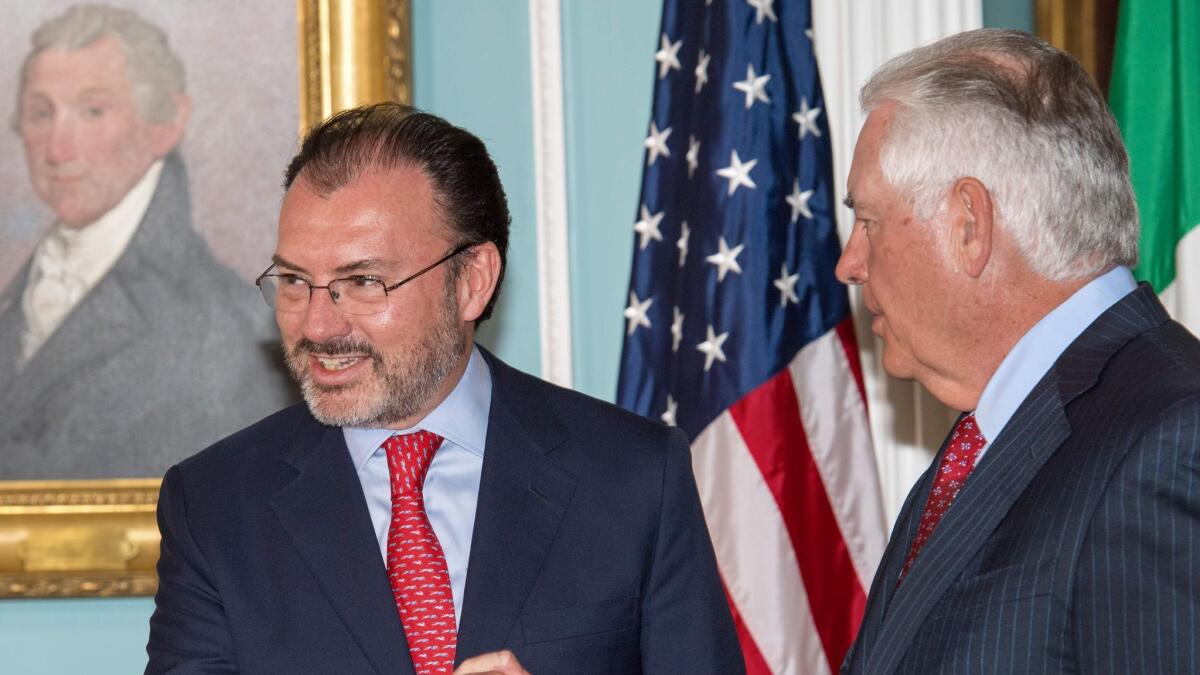Mexico signals tougher stance on NAFTA, may pull out of talks if Trump moves to scrap deal

- Share via
Reporting from Mexico City — On the eve of the second round of talks on the North American Free Trade Agreement, Mexican officials have publicly signaled a tougher negotiating stance in the face of renewed threats from President Trump to scrap the trade pact.
In essence, Mexico appears to be calling Trump’s bluff, calculating that a NAFTA withdrawal would likely trigger a backlash in the United States — where agriculture and other key economic sectors benefit significantly from the accord.
NAFTA has become highly politicized issue here as Trump has ramped up his attacks on the trade pact, which he has long assailed as a job-killing, factory-shuttering disaster for the U.S.
“We’re working right now on NAFTA, the horrible, terrible NAFTA deal that took so much business out of your state and out of your cities and towns,” Trump told an audience Wednesday in Missouri.
“We gotta change this deal,” Trump continued. “And hopefully we can renegotiate it, and if we can’t, we’ll terminate it and we’ll start all over again with a real deal.”
In response, Mexican leaders have upped the ante, indicating that the nation may have to contemplate what was once unthinkable — life without NAFTA, which has been a cornerstone of Mexico’s economic strategy since it took effect in 1994, strengthening the economic ties between the U.S., Mexico and Canada.
“The government of Mexico is not going to litigate or negotiate any aspect of the bilateral relationship … through the [press] or through social media,” Mexican Foreign Secretary Luis Videgaray told reporters Wednesday during a trip to Washington. “The position of the Mexican government is a serious position, it’s a professional stance based on the sovereignty of Mexico and the national interest.”
Asked if Mexico would remain in talks if Trump initiated the lengthy process to withdraw from NAFTA, the foreign secretary responded with an unequivocal “no.”
The amping up of rhetoric on both sides suggests that the second five-day round of NAFTA renegotiations, scheduled to start Friday in Mexico City, could be far more contentious than the first round, which was held in Washington this month.
Adding to an atmosphere of distrust is another controversy: Trump’s continued insistence that Mexico will pay for his planned wall along the U.S.-Mexico border. Both the wall and revamping or dumping NAFTA were among Trump’s core campaign promises.
When Trump attacked NAFTA and insisted that Mexico pay for the wall following his inauguration in January, the Mexican government of President Enrique Peña Nieto seemed stunned. Further attacks were met with measured discomfort.
Its new, emboldened stance comes in part because fears of an economic collapse have ebbed as the Mexican peso has recovered from a steep slide widely linked to the “Trump effect,” the negative toll that new president’s perceived anti-Mexico agenda had on the Mexican currency.
The perception here that Trump’s domestic support is eroding may have also figured in Mexico’s more robust response, analysts said .
The government’s position appears popular at home, where Peña Nieto is enduring feeble approval ratings and his ruling party is trailing in early surveys for next year’s presidential balloting.
“There are certain things that our government should not permit under any circumstances, among them that a foreign government tramples on our dignity and sovereignty,” columnist Manuel J. Jauregui wrote Wednesday in Mexico’s Reforma newspaper.
Authorities here appear to view Trump’s stepped-up NAFTA rhetoric more as a negotiating ploy and attempt to gain leverage than a serious move to abandon a trade scheme that has considerable support in farm states and other parts of Trump’s political base.
Washington is said to be seeking guarantees for a larger share of U.S.-made goods moved under NAFTA as part of a bid to reduce the more than $60-billion trade deficit with Mexico.
If Trump were to withdraw from NAFTA, the process is long and opaque, starting with a requirement that he give six months notice in writing. He could also face challenges in the courts or from Congress.
Close to 80% of Mexico’s exports go to U.S., many with zero tariffs thanks to the favorable trade regime.
Mexican Finance Secretary Ildefonso Guajardo, Mexico’s chief negotiator, has said that the nation has to have a “Plan B” ready should NAFTA fall by the wayside.
“We also have to think about a scenario without NAFTA,” the finance secretary told lawmakers this week. “And this scenario without NAFTA, what does it mean? One cannot overstate it or underestimate it.”
A third round of NAFTA talks is slated for later in September in Canada.
Negotiators have said they envision seven rounds of talks and hope to wrap up the matter by December. Mexico is keen to conclude before campaigning begins in earnest for presidential elections scheduled for July 2018. But many experts have expressed doubts that will happen.
twitter: @mcdneville
--Cecilia Sanchez of the Times’ Mexico City Bureau contributed.
ALSO
Mexico says it won’t renegotiate NAFTA with President Trump via Twitter
If Trump pushes ‘buy American’ in NAFTA talks, he may get more than he bargained for
Any NAFTA revamp probably won’t mess with the energy sector
More to Read
Sign up for Essential California
The most important California stories and recommendations in your inbox every morning.
You may occasionally receive promotional content from the Los Angeles Times.










